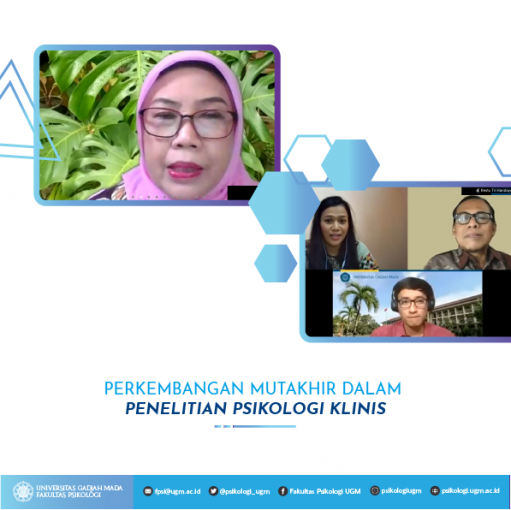
Together with the Clinical Psychology Expertise Group, the Psychology Doctoral Program of the Faculty of Psychology UGM held an intensive course entitled “Recent Developments in Clinical Psychology Research” which lasted for 3 days, starting from Monday-Wednesday (8-10 / 3). Some of the topics raised in this event included “Current Issues in Diagnosis”, “Personality Disorders & Neuropsychology”, “Prevention & Early Detection for Psychosis”, “From Transpersonal Psychology to Clinical Hypnosis”, “Current Research in Depression, Self Harm & Suicide “,” Current Issues in Health Psychology “, and” Advocacy in Mental Health System Development “which were discussed by 15 competent speakers in clinical psychology research. In addition, this event was also open to the public, so there were many people attending from various backgrounds.
Before entering the material session, this event was first opened by Rahmat Hidayat, S.Psi., M.Sc., Ph.D. as the Head of the Psychological Science Doctoral Study Program. Rahmat explained that events like this were not only held by the Clinical Psychology Expertise Group, but other Psychology Expertise Groups. “Thus, we hope that what we discuss in the intensive course are areas of frontist development, areas of recent development in each field,” said Rahmat.
The first day, this event starts at 09.00 WIB with the resource person Prof. Drs. Subandi, M.A., Ph.D., Psychologist and Tri Hayuning Tyas, S.Psi., M.A., Psychologist. In this session, Subandi and Tri conveyed about “Current Issues in Diagnosis”. Through this topic, Subandi explained that diagnosis is very important because it is the same language used for several professions. In the clinical field, psychiatrists, psychologists, nurses, and others need to have the same language. “The diagnosis will be widely used for treatment plans to provide treatment and evaluation”. Apart from that, diagnosis is also used in other fields of science, including use in the trial process, “explained Subandi.
Continuing Subandi’s explanation, Tri said that the reliability of psychiatric diagnosis among practicing doctors is still low. “There are many weaknesses of a diagnostic model like the one that DSM has. If one has been decided, it is impossible to diagnose the other, unless what is called comorbidity occurs. This means a dual diagnosis, or maybe even a triple one. Although it is rare, it can happen, ”explained Tri. However, DSM has involved various parties, including non-professionals with a dozen years of process through conferences to get input related to categorization.
Then in the second session which started at 13.00 WIB delivered by Supra Wimbarti, M.Sc., Ph.D., Psychologist and Restu Tri Handoyo, M.Psi., Ph.D., Psychologist. Wimbarti and Restu had the opportunity to talk about “Personality Disorders & Neuropsychology”. “Since what will be discussed is neuropsychology, I will start with Eysenck’s theory of personality, which in fact has already presented the biological basis of personality several decades ago,” Supra explained. Meanwhile, the personality disorders described in this session include borderline, narcissistic, and obsessive compulsive personality.
Then on the second day, this event started at 09.00 WIB with the topic “Prevention & Early Detection for Psychosis” which was again conveyed by Prof. Drs. Subandi., M.A., Ph.D., Psychologist and Ardian Praptomojati, S.Psi., M.Psi., Psychologist. Subandi explained that psychosis / schizophrenia is a serious mental disorder and is classified as a heavy mental disorder by the Ministry of Health. “So it is actually very little compared to the prevalence of depression, but schizophrenia is given greater attention because the impact caused by this disorder is very serious,” said Subandi. Ardian also went on to explain that schizophrenia is one of the top 10 causes of disability-adjusted life years which not only has a physical and psychological impact, but also has an impact on the economy.
In the second session, the event was continued with the topic “From Transpersonal Psychology to Clinical Hypnosis” which began at 13.00 WIB. On this topic, Prof. Kwartarini Wahyu Yuniarti, M.Med.Sc., Ph.D., Psychologist and Satwika Rahapsari, S.Psi., M.A., R-DMT.
Then on the third day, which is the last day of the event, it opened at 08.00 WIB. The first session on the third day was filled by Prof. Dr. Sofia Retnowati, M.Si., Psychologist., Dr. Muhana Sofiati Utami, M.Sc., Psychologist., And Adelia Khrisna Putri, S.Psi., M.Sc with the topic “Recent Research on Depression, Self-Injury & Suicide”. Sofia explains that depression is a common disorder, “Sometimes we may not recognize because depression takes many forms, especially what we now call the mask of depression.”
Then in the second session which started at 10.00 WIB with the topic “Current Problems in Health Psychology”. This session was filled by Dr. Nida Ul Hasanat, M.Si., Psychologist., Dr. Esti Hayu Purnamaningsih, M.Si., Psychologist, and Dr. Ira Paramastri. Through this session, Nida explained that illness and pain are different things. Disease is a disease as a part of the body that is not healthy and does not function. While illness is a subjective feeling, a person’s feelings when he feels something is wrong in the body and illness is something that has social implications in society. Finally, the event was closed with the topic “Advocacy in Mental Health System Development” which was filled by Diana Setyawati, M.H.Sc., Ph.D., Psychologist and Idei Khurnia Swasti, S.Psi., M.Psi., Psychologist.
